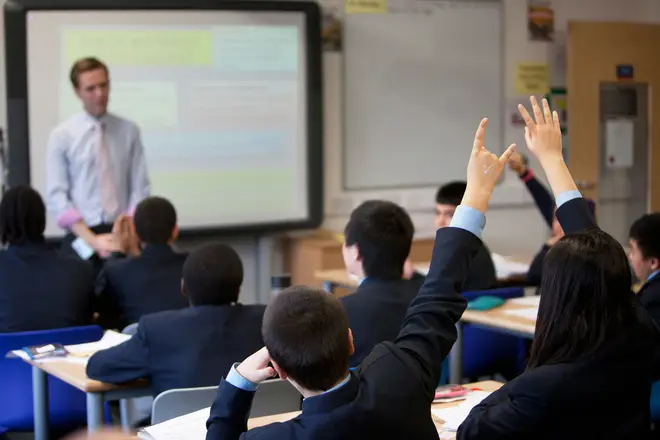
Clive Bull 1am - 4am
2 September 2021, 23:50 | Updated: 2 September 2021, 23:53

A "significant surge" in coronavirus cases is expected in the UK as schools reopen, a leading expert has said.
Professor Neil Ferguson, whose modelling was instrumental to the UK going into lockdown in March 2020, said if daily cases start going above 100,000 to 150,000 there will be "significant demands on the health system".
The scientist, from Imperial College London and a member of the Scientific Advisory Group for Emergencies (Sage), said it is too early to say whether that might mean the relaxation of restrictions needs to be rolled back.
He said it will be for the Government to decide on potential measures and would not be drawn on what form they might take.
Read more: Government scientists receive 'suspicious packages' and abuse from anti-vaxxers
Read more: 'Not good enough': UK school Covid closures revealed as second longest in Europe
Speaking to reporters during a webinar on Thursday, he said there are concerns about the effect schools reopening could have on virus spread, especially with the more transmissible and now-dominant Delta variant.
He said: "We expect to see quite a significant surge in cases, to some extent in hospitalisations, but whether that's going to require any rolling back of the relaxation of restrictions is too early to say.
"It really depends on the level of healthcare demand."
He said if an unvaccinated population of 5 or 10 per cent all got Covid in a short period of time it would result in a "large healthcare burden, and a large number of deaths" and that it could also "have a risk of significantly overwhelming health systems even in high income countries such as the UK".

Professor explains third Covid jab for those with weakened immune systems
He said it is hard to predict how long any rise in case numbers, as seen in Scotland after schools went back, would go on for.
He said: "Obviously the relationship between case numbers and hospitalisations has changed now, fundamentally because of vaccination.
"So we can cope with much higher numbers of cases per day and still maintain hospitalisations at, well, the Government would say acceptable levels, and deaths would be even lower, but that only holds for so long.
"So if we do get above 100,000/150,000 cases a day, then we start seeing very significant demands on the health system, and it will be up to the Government to decide at that point, or at some maybe earlier point, what the implications are for policy.
"I'm not going to get drawn on what that might be."

Scientists who helped develop vaccine praise Harry’s comments
On Wednesday, the Government said there had been a further 35,693 lab-confirmed Covid-19 cases in the UK.
The figures followed a bank holiday weekend when there is usually a lag in reporting deaths and cases.
Read more: Joe Rogan tests positive for Covid after suggesting young people don’t need jab
Read more: Prince Harry hits out at anti-vaxxers 'who peddle lies & fear' at GQ awards speech
However the Zoe Covid study with King's College London (KCL) estimated there are currently 57,158 new daily symptomatic cases in the UK on average, based on test data from up to five days ago, an increase from around 51,000 new daily cases last week.
On average 1 in 90 people in the UK currently have symptomatic Covid, they added.
Professor Tim Spector, lead scientist on the study and professor of genetic epidemiology at KCL, said: "The UK has enjoyed a restriction-free summer unlike most of Europe and even though a large majority of UK adults are now vaccinated, the rise in cases, as well as hospitalisations and deaths is one of the highest in Europe.
"This is evidence that without at least some restrictions Covid will continue to spread.
"Fully vaccinated people are getting Covid, but not only are they often unable to spot the signs of infection due to the Government's outdated list of symptoms, we've seen evidence that the protection provided by vaccines is wearing off."
He advised people to be responsible in trying to stop the spread by wearing masks, particularly in crowded places, and practising good handwashing and social distancing where possible.
Read more: People aged 12 and over with weakened immune systems to get third Covid vaccine dose
Read more: Portugal to allow non-vaccinated Brits in without quarantine
In contrast, the latest weekly Test and Trace figures showed the number of people testing positive in England has fallen slightly.
A total of 198,626 people tested positive for the virus at least once in the week to August 25, down 1 per cent on the previous week.
The number of people testing positive has been around 200,000 in the five most recent weeks of data.